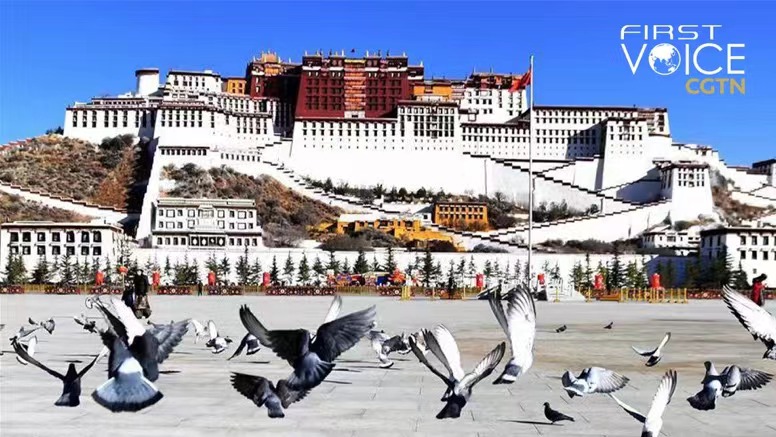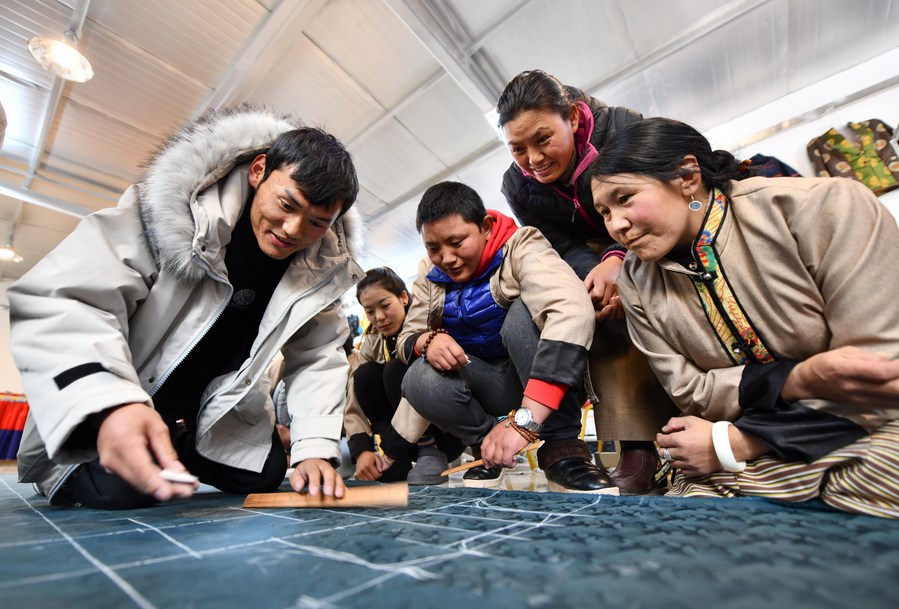
The Potala Palace in Lhasa, capital of southwest China's Tibet Autonomous Region. /Xinhua
The Potala Palace in Lhasa, capital of southwest China's Tibet Autonomous Region. /Xinhua
Editor's note: CGTN's First Voice provides instant commentary on breaking stories. The column clarifies emerging issues and better defines the news agenda, offering a Chinese perspective on the latest global events.
Experts mandated by the UN Human Rights Council on Thursday accused the Chinese government of forcing Tibetans into vocational training programs that could lead to "forced labor." The vocational training and labor transfer programs in China were used as a pretext to "undermine Tibetan religious, linguistic and cultural identity, and to monitor and indoctrinate Tibetans," the so-called experts voiced their "concerns."
The accusations are unfounded. China's Tibet Autonomous Region has witnessed historic progress in its human rights cause. However, some Westerners have repeatedly launched unscrupulous attacks on Tibet. Accusing the Chinese government of suppressing religious freedom and breaching human rights, these so-called experts have never presented a single piece of solid evidence.
The vocational training programs were established to meet Tibet's rising demand for skilled talents. The region has entered a new phase of high-quality growth. The rapid development of various industries means the necessity to cultivate skilled personnel. The vocational training programs have thrived in this context to satisfy the region's need to boost the economy, not to "monitor and indoctrinate Tibetans" as some Westerners hype.
In addition, through study and training, students could master skills needed for their future employment and secure jobs with higher incomes. Vocational schools, according to Xinhua reports, have also cooperated with multiple enterprises to help with students' employment including providing them with free workspace. Since 2016, millions of farmers and herders in Tibet have landed new jobs, according to the regional human resource authority.
While most of the Tibetans lived under feudal serfdom and abject penury with their labor exploited by lords and serf owners before the peaceful liberation in 1951, an increasing number of farmers and herders have the freedom and opportunity to pursue a career different from their ancestors' thanks to vocational training programs.

Students learn tailoring techniques at a vocational school in Lhasa City, capital of southwest China's Tibet Autonomous Region, November 23, 2020. /Xinhua
Students learn tailoring techniques at a vocational school in Lhasa City, capital of southwest China's Tibet Autonomous Region, November 23, 2020. /Xinhua
Widespread progress in Tibet's human right cause is not empty talks. Economically, Tibet had lifted all of its 74 poverty-stricken counties and residents out of poverty by the end of 2019. Religiously, Tibet has over 1,700 religious sites for Buddhism activities, four mosques, and one Catholic Church. Millions of people come to Tibet to worship the Buddha with no "political" obstruction. All religions and sects are equal, and religious freedom has never been an issue in the region.
Culturally, Tibetan script has become the first ethnic minority script in China with an international standard. The population of ethnic Tibetans saw an increase of 30 percent from 2000, or nearly 16 percent from 2010, to 3.14 million in 2020.
The Chinese government's "undermining Tibetan religious, linguistic and cultural identity"is a pure lie. However, despite compelling evidence of widespread progress in Tibet, some so-called experts continue to level groundless accusations disregarding the basic facts. Making unfounded claims on China's human rights conditions, they are being used by anti-China forces.
Certain Western institutions and individuals have been obsessed with interfering in internal affairs of other countries. And China is bearing the brunt. "Human rights" has always turned out to be an ideal cloak to advance their anti-China campaign. Apart from Tibet, these forces have been lying on Xinjiang, Hong Kong, and Taiwan. Unscrupulous attacks against the Chinese government that are based on rumors will only end up exposing the hypocrisy of these Western forces.
Relevant special procedures' experts should do more research on the real situation in Tibet and other places in China so as to avoid being used by these anti-China forces. Slanders will not stop the progress in Tibet and the growth of China. Anti-China advocates should understand this before pouring dirty water on China.
(If you want to contribute and have specific expertise, please contact us at opinions@cgtn.com. Follow @thouse_opinions on Twitter to discover the latest commentaries in the CGTN Opinion Section.)